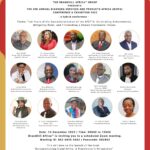African arts and culture
African arts and culture is diverse and rich, encompassing a wide range of artistic practices, traditions, and expressions. It reflects the history, beliefs, values, and customs of the various ethnic groups and nations across the African continent.
Visual arts play a significant role in African culture, with various forms of traditional and contemporary art prevalent. African masks, sculptures, pottery, textiles, jewelry, and basketry are distinct and often characterized by vibrant colors, intricate designs, and the use of natural materials.
Music and dance are essential components of African culture, serving as a means of communication, celebrating important events, and expressing emotions. African music is known for its rhythmic complexity, polyphonic vocals, and the use of instruments such as drums, xylophones, koras, and balafons. Traditional African dances vary across regions and tribes, showcasing vibrant movements, storytelling, and communal participation.
Literature and oral tradition have played a pivotal role in preserving African history, myths, and folktales. Many African societies have a strong tradition of oral storytelling, where knowledge and cultural values are passed down from generation to generation through spoken narratives. Contemporary African literature has gained international recognition and has produced renowned authors such as Chinua Achebe, Chimamanda Ngozi Adichie, and Wole Soyinka.
African cuisine is diverse, often reflecting the agricultural resources and cooking techniques of different regions. Staples such as grains (such as maize, millet, and sorghum), tubers (such as yams and cassava), vegetables, and various meats and fish are commonly used. African cuisine is known for its rich flavors, spices, and the communal aspect of sharing meals.
Religion and spirituality are integral parts of African culture. Traditional African religions, which vary from region to region, often involve belief in a higher power, ancestral worship, and the presence of spirits in the natural world. Islam and Christianity were introduced to Africa through trade, colonization, and missionary efforts, and have become prominent religions across the continent.
In recent years, African arts and culture have gained increased recognition globally, with the African diaspora contributing significantly to contemporary art, music, fashion, and literature. African cultural festivals, such as the Festival au Désert in Mali, the Mawazine Festival in Morocco, and the Cape Town International Jazz Festival in South Africa, attract both local and international audiences, celebrating the rich heritage of the continent.










